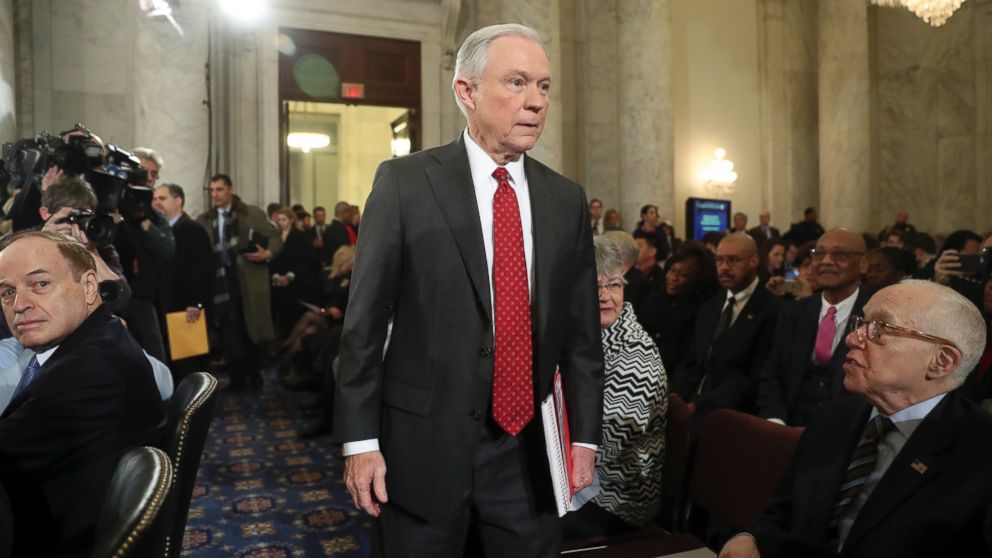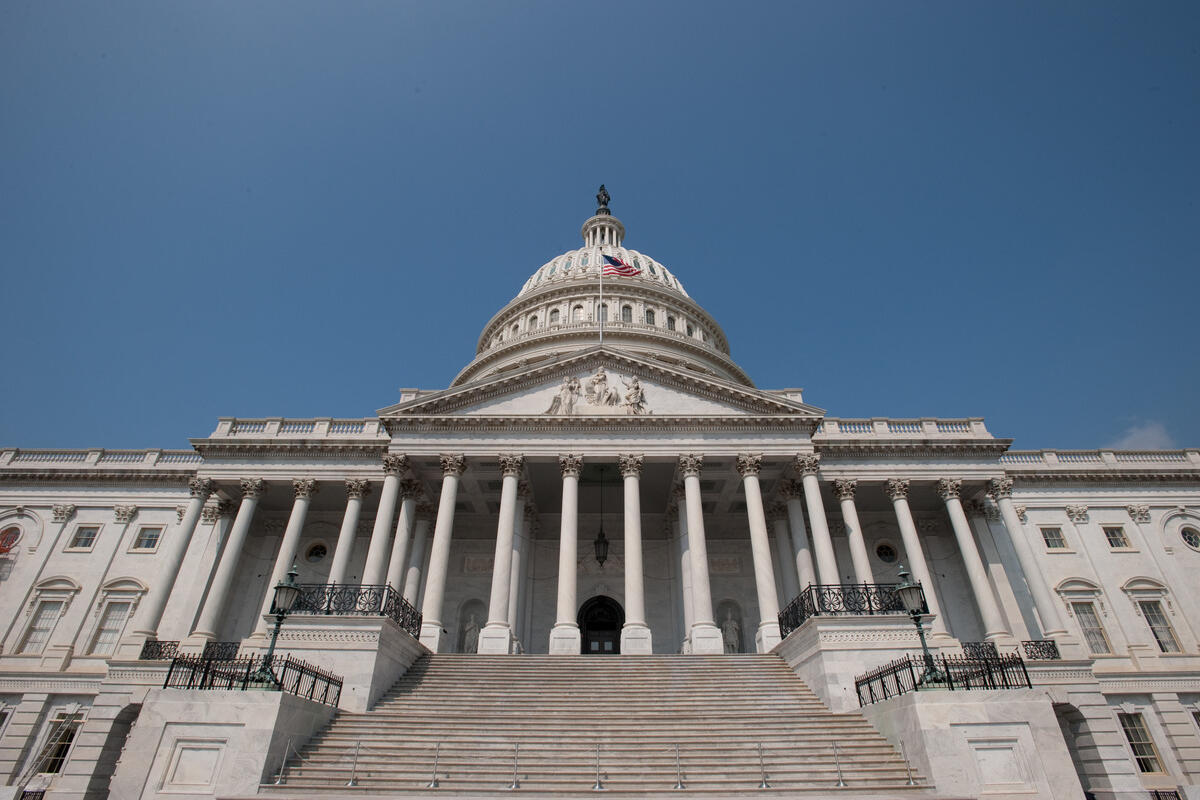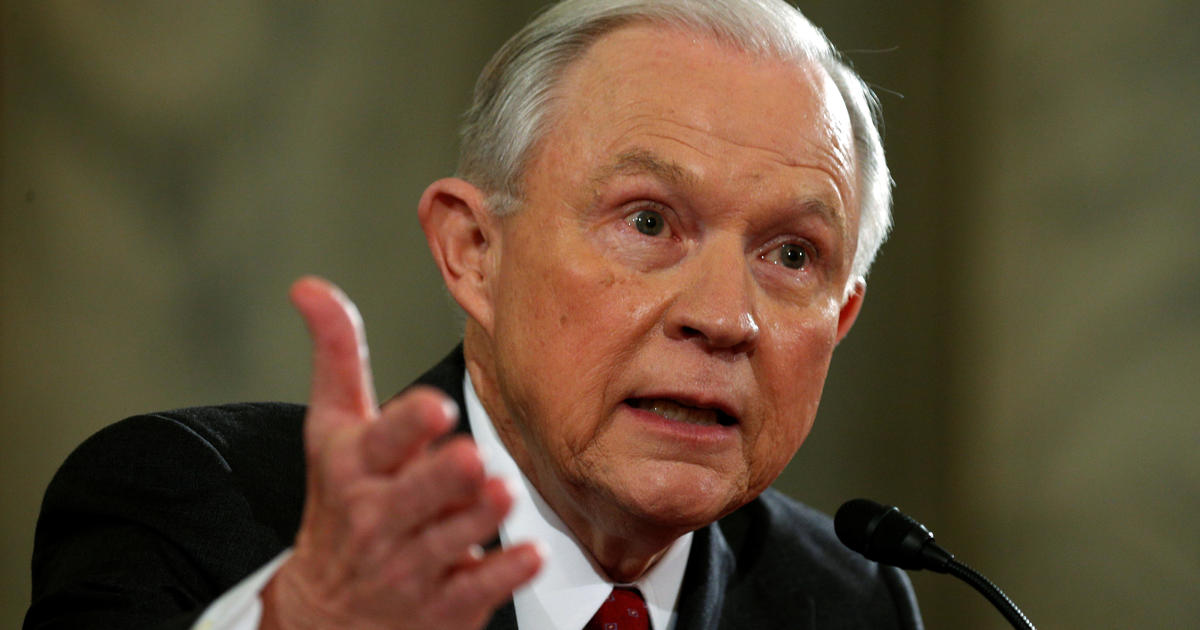 Donald Trump’s pick to be the next U. S. attorney general vehemently disputed “amazing” allegations that he harbors racial bias, insisting to a Senate panel today that decades-old accusations suggesting he supported the Ku Klux Klan are absolutely false and that the nation “can never go back” to its dark days of legal discrimination.
Donald Trump’s pick to be the next U. S. attorney general vehemently disputed “amazing” allegations that he harbors racial bias, insisting to a Senate panel today that decades-old accusations suggesting he supported the Ku Klux Klan are absolutely false and that the nation “can never go back” to its dark days of legal discrimination.
“I abhor the Klan and what it represents and its hateful ideology,” Sen. Jeff Sessions, R-Ala., told the Senate Judiciary Committee, which is holding confirmation hearings this week to consider his nomination to lead the Justice Department.
He walked into the Senate hearing room this morning to shouting from some protesters dressed in Ku Klux Klan costumes and others holding signs saying, “Stand against xenophobia” and “Love trumps hate. ” Sessions seemed unfazed, and many in the room cheered as the protesters were removed. His testimony was interrupted by other protesters several times today. At least two other people interrupted his opening remarks, one shouting, “No Trump, no KKK, no fascist USA. “
In his statement to the committee this morning, he vowed to tell Trump “no” when necessary. Sessions defended law enforcement officers across the country who have been “unfairly maligned” in recent years, and he insisted he understands the struggle for justice by “our African-American brothers and sisters” and the lesbian, gay, bisexual and transgender community.
Hours into today’s hearing, he faced tough questions over his record on civil rights and his plan for cooling tensions between law enforcement officers and the communities they serve.
Sessions, 70, has faced significant criticism from top Democrats and some civil rights groups over decades-old allegations that he made racist remarks when he was a U. S. attorney in Alabama. Today he dismissed the allegations as outright false or taken out of context.
“I hope my tenure in this body shows you that the caricature of me wasn’t accurate,” Sessions told senators. “It wasn’t accurate then, and it’s not accurate now. “
The chairman of the Senate Judiciary Committee, Charles Grassley, R-Iowa, said Sessions’ 20 years in the Senate mean “we know him well. “
“He is a man of honor and integrity, dedicated to the faithful and fair enforcement of the law, who knows well and deeply respects the Department of Justice and its role,” Grassley said in his opening remarks, noting that as U. S. attorney in Alabama during the 1980s, Sessions “oversaw the investigation of Klansman Francis Hays for the brutal abduction and murder of a black teenager, Michael Donald. “
During what may have been the most uncomfortable moments for Sessions during the first half of the day, Al Franken, D-Minn., pressed Sessions on whether he has “misrepresented” or “inflated” his role in prosecuting civil rights cases and standing up for minorities when U. S. attorney. In particular, Franken took aim at Sessions’ claim that he “personally handled” several cases, suggesting the extent of his involvement in those cases may have been just signing charging documents.
Sessions fired back, saying he not only signed the documents but also “provided assistance and guidance” to attorneys working on the cases and “attempted to be as effective as I could be in helping them be successful in these historic cases. “
He added that he “had an open door policy with them and cooperated with them on these cases. “
Sessions said in his opening remarks, “I understand the demands for justice and fairness made by the LGBT community. “
But the top Democrat on the committee, Dianne Feinstein, D-Calif., called Sessions’ record “extremely conservative” and emphasized that the next attorney general must enforce the law “equally for all Americans,” not advocate for his own beliefs.
She noted that he has taken what she called “deeply concerning” stances, including support for keeping people out of the United States based on their religion, support for “illegal” waterboarding of terrorism suspects and opposition to LGBT rights legislation.
Other critics have also pointed to Sessions’ dismay at the Supreme Court’s 2015 ruling that same-sex couples have a constitutional right to marry and his opposition to the Matthew Shepard Act, which expanded the definition of hate crimes to include attacks on people because of their sexual orientation, gender or disability.
Asked during today’s hearing whether he believes the issue of same-sex marriage is settled — now that the Supreme Court has ruled that gay and lesbian couples may marry nationwide — Sessions said he will “follow that decision. ” He explained that he opposed the Matthew Shepard Act out of “a concern that it appeared that these cases were being prosecuted effectively in state court” but said that since it has become law and “the Congress has spoken, you can be sure that I will enforce it. “
During her opening remarks, Feinstein cited Trump’s promise on the campaign trail that his attorney general would appoint a special prosecutor to investigate Hillary Clinton.
“That’s not what an attorney general does,” Feinstein said. “The attorney general does not investigate or prosecute at the direction of the president. “
Sessions vowed today that as attorney general, he would recuse himself from any matters related to Clinton.
On the campaign trail, he spoke out against Clinton over her use of a private email server as secretary of state, which became the subject of an FBI criminal investigation.
Sessions noted that the presidential campaign was “contentious” and that he made several comments about Clinton’s possible criminal culpability.
“I do believe that could place my objectivity in question … I think the proper thing would be to recuse myself,” he told the other senators.
Much of Sessions’ opening remarks today focused on the “heroin epidemic” across America and the jump in violent crime in certain U. S. cities, including a record-setting number of murders and shootings in Chicago last year.
“These trends cannot continue,” he said. “It is a fundamental civil right to be safe in your home and your community… It will be my priority to confront these crises vigorously, effectively and immediately. “
Sessions vowed to support state and local law enforcement across the country, calling recent attacks on police in the line of duty “a wake-up call” and recognizing the officers killed in the line of duty in Florida Monday. The alleged murderer of one officer is still the target of an extensive manhunt.
“That is the kind of thing that too often happens,” he said, adding that “there is virtually no defense” for assaulting a police officer and that recent criticism of law enforcement is making matters worse.
“In the last several years, law enforcement as a whole has been unfairly maligned and blamed for the actions of a few bad actors and for allegations about police that were not true,” he said. “I do believe that we are failing to appreciate police officers who place their lives at risk… We need to be sure that when we criticize law officers, it is narrowly focused on the right basis for criticism. And to smear whole departments places those officers at greater risk. “
Many Democrats have expressed concern over testimony during Sessions’ confirmation hearing for a federal judgeship in 1986, when some accused Sessions of calling a white civil rights lawyer a “disgrace to his race” and dubbing some actions by the National Association for the Advancement of Colored People “un-American. “
“After four days of hearings and extensive testimony, Sessions’ nomination was rejected by a Republican-controlled Senate Judiciary Committee. He was too extreme for Republicans in 1986,” Sen. Patrick Leahy , D-Vt., wrote in The Boston Globe on Sunday. “Now that he is nominated to be attorney general, we will see if the same person is still too extreme for Republicans. “
Leahy, until recently the top Democrat on the committee, said, “Sessions has repeatedly stood in the way of efforts to promote and protect Americans’ civil rights. “
But Sessions today said, “This caricature of me in 1986 was not correct. I conducted myself honorably and properly at that time,” and “I did not harbor the animosities… that I was accused of. I did not. “
Sessions later described how, growing up in the South, he saw discrimination firsthand and had “no doubt” that it hurt many other Southerners.
“I know that was wrong. I know we need to do better. We can never go back,” he said.
“I deeply understand the history of civil rights and the horrendous impact that relentless and systemic discrimination and the denial of voting rights has had on our African-American brothers and sisters,” he insisted.
He promised that politics will play no role in his Justice Department .
“The Office of the Attorney General of the United States is not a political position, and anyone who holds it must have total fidelity to the laws and the Constitution of the United States,” Sessions said today.
Asked today whether he believed the U. S. intelligence community’s unanimous conclusion that the Russian government was behind a series of cyberattacks aimed at affecting the presidential election, Sessions said, “I have no reason to doubt that, and have no reason to believe otherwise. ” He said that he is “sure” the FBI’s conclusions blaming Russia were “honorably reached” and that “it is appropriate for a nation to retaliate against” government-sponsored hacks.
But he said he knows only “what the media says about” the pre-election attacks, and he indicated he was holding off on a final opinion until he is briefed by the FBI.
Later in the hearing, Sheldon Whitehouse, R-R. I., asked Sessions whether he would allow the Justice Department and FBI to continue investigating Russian connections, even if those probes lead to the Trump campaign or Trump associates. Sessions said, “If there are laws violated and can be prosecuted, you’ll have to handle that in an appropriate way. “
But, he added, “the problem may turn out to be” that, like the huge hack of the U. S. Office of Personnel Management carried out on behalf of the Chinese government, such matters may be best handled at the political level.
© Source: http://abcnews.go.com/Politics/jeff-sessions-dismisses-racism-claim-hints-trump-justice/story?id=44667596
All rights are reserved and belongs to a source media.
 Microsoft is shifting its licensing for its Azure cloud service, eliminating the pay-as-you-go option for new Azure customers using MPSA (Microsoft Products and Services Agreement) as of Feb. 1. Instead, they will be steered toward the company’s CSP (Cloud Solution Provider) program.
Microsoft is shifting its licensing for its Azure cloud service, eliminating the pay-as-you-go option for new Azure customers using MPSA (Microsoft Products and Services Agreement) as of Feb. 1. Instead, they will be steered toward the company’s CSP (Cloud Solution Provider) program. 

 The annual Consumer Electronics Show in Las Vegas is always a big showcase for the latest new technologies including security and the 2017 edition of the show, which ran from Jan. 5 to 8, was no exception. A one major theme at CES in recent years has been connected consumer devices, commonly referred to now at the Internet of Things. IoT devices have helped to introduced new security risks for consumers and technology devices have responded with new devices and software to help protect them from emerging security threats. At CES 2017 both ends of the IoT spectrum were well represented with new devices for home security as well as new technologies to help protect connected devices. Among the new IoT devices announced at CES 2017 is a security floodlight from Ring that provides an internet-connected camera as part of a motion sensing outdoor light fixture. To help protect against insecure IoT devices, multiple vendors including Symantec, McAfee and Bitdefender announced new technologies to help secure consumer networks. Improving the security of user access was also a key theme with new security authentication products announced by Kensington and Yubico. In this slideshow takes a look at seven security products that were announced at CES.
The annual Consumer Electronics Show in Las Vegas is always a big showcase for the latest new technologies including security and the 2017 edition of the show, which ran from Jan. 5 to 8, was no exception. A one major theme at CES in recent years has been connected consumer devices, commonly referred to now at the Internet of Things. IoT devices have helped to introduced new security risks for consumers and technology devices have responded with new devices and software to help protect them from emerging security threats. At CES 2017 both ends of the IoT spectrum were well represented with new devices for home security as well as new technologies to help protect connected devices. Among the new IoT devices announced at CES 2017 is a security floodlight from Ring that provides an internet-connected camera as part of a motion sensing outdoor light fixture. To help protect against insecure IoT devices, multiple vendors including Symantec, McAfee and Bitdefender announced new technologies to help secure consumer networks. Improving the security of user access was also a key theme with new security authentication products announced by Kensington and Yubico. In this slideshow takes a look at seven security products that were announced at CES.
 Democratic groups and figures weren’t the only ones targeted in Russia’s suspected campaign to influence last year’s U. S. election. Russian cyberspies also targeted computers from state-level Republican groups and stole information from local voter registration records, FBI director James Comey said.
Democratic groups and figures weren’t the only ones targeted in Russia’s suspected campaign to influence last year’s U. S. election. Russian cyberspies also targeted computers from state-level Republican groups and stole information from local voter registration records, FBI director James Comey said. 
 Well, CES 2017 is over. We don’t know if you were busy last week, but things were pretty crazy here at TR HQ. We doubled down on CES coverage and did our best to take a good look at all the hardware news that poured out from the show.
Well, CES 2017 is over. We don’t know if you were busy last week, but things were pretty crazy here at TR HQ. We doubled down on CES coverage and did our best to take a good look at all the hardware news that poured out from the show. 
 Battery tests run by CNET Labs fell within our acceptable parameters across multiple runs.
Battery tests run by CNET Labs fell within our acceptable parameters across multiple runs. 
 Российские спортсмены должны быть отстранены от всех международных спортивных соревнований. Такое совместное заявление сделали 19 национальных антидопинговых организаций по итогам специального заседания в Дублине, пишет РБК-Украина.
Российские спортсмены должны быть отстранены от всех международных спортивных соревнований. Такое совместное заявление сделали 19 национальных антидопинговых организаций по итогам специального заседания в Дублине, пишет РБК-Украина. 
 Republicans on the Senate Judiciary Committee mostly defended Sessions, expressing confidence that he would be confirmed, while Democrats used the opportunity to attack his voting record.
Republicans on the Senate Judiciary Committee mostly defended Sessions, expressing confidence that he would be confirmed, while Democrats used the opportunity to attack his voting record. 
 Barack Obama is returning to Chicago for one final speech – a parting plea to Americans not to lose faith in their future, no matter what they think about their next president.
Barack Obama is returning to Chicago for one final speech – a parting plea to Americans not to lose faith in their future, no matter what they think about their next president.
 Donald Trump’s pick to be the next U. S. attorney general vehemently disputed “amazing” allegations that he harbors racial bias, insisting to a Senate panel today that decades-old accusations suggesting he supported the Ku Klux Klan are absolutely false and that the nation “can never go back” to its dark days of legal discrimination.
Donald Trump’s pick to be the next U. S. attorney general vehemently disputed “amazing” allegations that he harbors racial bias, insisting to a Senate panel today that decades-old accusations suggesting he supported the Ku Klux Klan are absolutely false and that the nation “can never go back” to its dark days of legal discrimination.
 Here is a timeline of the shooting at the historic Emanuel AME Church in downtown Charleston, South Carolina:
Here is a timeline of the shooting at the historic Emanuel AME Church in downtown Charleston, South Carolina: 

